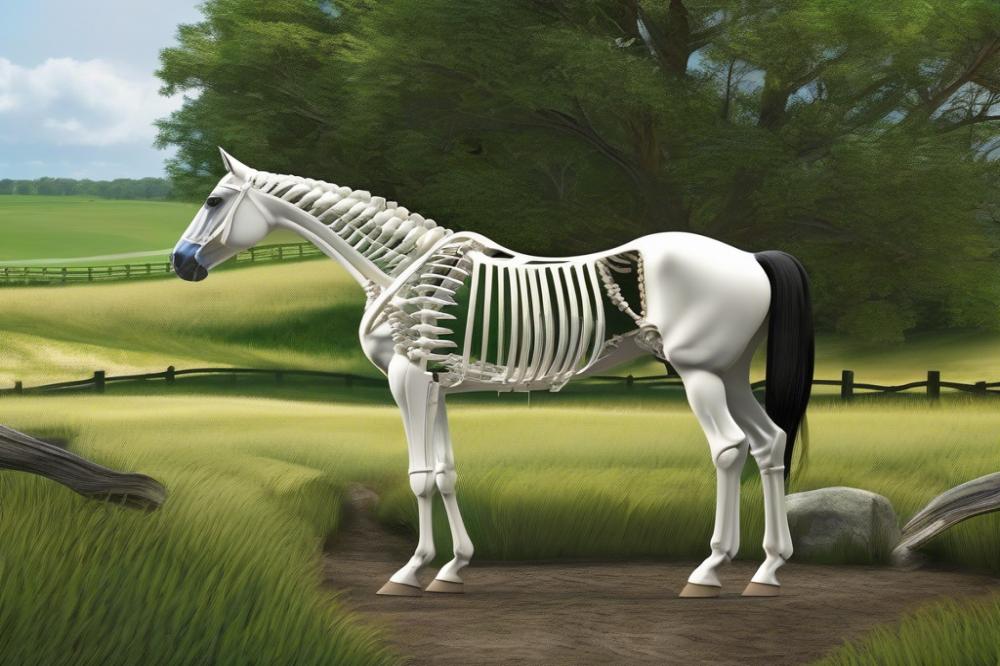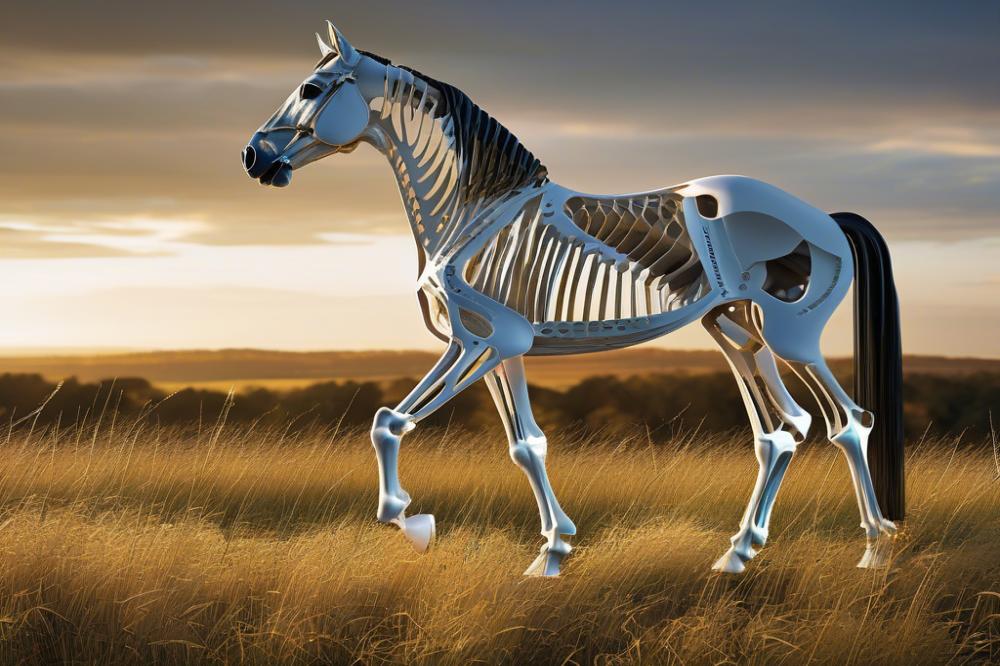Maintaining strong bones in Horses: Preventing Injuries and Weakness
Overview of the Importance of strong bones in Horses
Strong bones form the foundation of a horse’s overall well-being. They play a crucial role in a horse’s ability to perform various activities, from simple walking to competitive sports. When bones are robust, they can better withstand the strains and stresses associated with movement. Equally important, sound skeletal structure contributes to a horse’s longevity and quality of life.
Impact of bone density on Overall Health
bone density directly affects overall horse health. Low density can lead to fractures and other serious injuries, impacting a horse’s ability to engage in regular activities. A healthy bone structure supports other bodily functions, such as muscle attachment and organ protection. Additionally, strong bones help in preventing pain and discomfort, enabling horses to move freely and happily.
Purpose of the Article
This article aims to highlight effective strategies for maintaining bone strength in horses. Readers will gain insight into nutrition, exercise, and regular veterinary care. Understanding how to care for bones can prevent injuries and promote longevity in these magnificent animals. By prioritizing bone health, horse owners can ensure their companions lead active and fulfilling lives.
Understanding Bone Density in Horses

Bone density refers to the amount of mineral content within a horse’s bones. This aspect of bone health is significant because it directly impacts strength and resilience. Higher density typically means stronger bones that are less likely to break. Maintaining good bone density is essential for preventing injuries.
Several factors influence the density of equine bones. Nutrition plays a critical role. Horses need a balanced diet rich in calcium and phosphorus for optimal bone development. Regular exercise also contributes. Weight-bearing activities stimulate bone growth and maintenance. Additionally, environmental factors, such as the quality of living conditions, can affect density over time.
Role of Genetics and Age in Bone Health
Genetics have a substantial impact on bone structure and density. Some breeds naturally possess stronger bones. Others, however, may be predisposed to weaknesses. Breeders often consider these traits when selecting for various purposes, including sport or work.
Age is another important factor. Younger horses generally have more flexible bones that adapt better to stress. As they grow older, bones can lose density and become more brittle. Understanding these dynamics is crucial for horse owners. Keeping a horse healthy means paying attention to both genetic background and age-related changes.
Essential Components of Equine Nutrition

A horse’s diet plays a crucial role in maintaining bone health. Key nutrients support strong skeletal structures. Horses require a balanced intake of various minerals and vitamins. Each nutrient contributes to bone integrity and functionality. Let’s take a closer look at what these essential components are.
Nutrients crucial for strong bones
Calcium is one of the most critical minerals for bone strength. Phosphorus works hand-in-hand with calcium. Both elements are vital in building and maintaining bone density. A lack of either can lead to issues in the skeletal system. Noticing signs of weakness or pain might indicate an imbalance. Therefore, monitoring their intake is essential.
Importance of calcium and phosphorus balance
Striking the right balance between calcium and phosphorus is key. An improper ratio can cause problems like bone deformities. A general guideline suggests a 2:1 ratio of calcium to phosphorus. This balance helps ensure optimal bone development. It allows horses to thrive in various activities, whether in training or leisure.
Role of vitamins and minerals in bone health
In addition to calcium and phosphorus, other vitamins and minerals enhance bone strength. Vitamin D, for instance, aids in calcium absorption. It plays a vital role in maintaining healthy bones. Additionally, magnesium supports bone structure and function. Zinc and copper are also important; they contribute to collagen synthesis, which is necessary for the bone matrix.
Dietary sources for optimal nutrition
Finding the right foods can help provide necessary nutrients. Legumes and green forages are excellent sources of calcium. Grains, such as oats, can provide phosphorus. Mineral supplements are available for horses that need a little boost. Discussing these options with a veterinarian can provide tailored advice. Ensuring that your horse receives a varied diet is important for overall health.
Developing an Effective Exercise Regimen
Regular exercise plays a crucial role in maintaining healthy bones in horses. Just like humans, horses require physical activity to develop and keep strong bones. When a horse engages in consistent exercise, it promotes better bone density and overall strength.
Various types of exercises can be beneficial for bone health. Ground exercises, such as lunging and long lining, allow horses to build muscle and support their bones without excessive impact. Trail riding offers the added benefit of varied terrain, which helps stimulate bone growth. Additionally, jumping exercises can also challenge the skeletal system in a controlled manner, reinforcing strength.
It is important to follow specific guidelines when creating a training regimen. Start each session with sufficient warming up to prepare the horse’s muscles and joints. Gradually increase the intensity and duration of workouts, giving the horse time to adapt. Incorporate rest days to prevent overexertion and fatigue, ensuring they remain fit and healthy.
Injury prevention is a key component of any exercise plan. Conditioning a horse properly minimizes the risk of strains and fractures. Always assess the horse’s fitness level before starting intense training. Proper hoof care and maintaining a suitable footing in the arena or trail also contribute significantly to safety during workouts.
Weight Management and Its Impact on Bone Health
Understanding the relationship between weight and bone strength is essential for horse owners. Excess weight can put unnecessary stress on bones and joints. This can lead to injuries and conditions like arthritis. On the other hand, underweight horses may struggle to maintain proper muscle and bone density. A balance is crucial for overall health.
Strategies for maintaining a healthy weight should focus on diet and exercise. Providing a well-balanced diet is important. High-quality hay, grains, and supplements help. Horses also need regular physical activity to build strength and endurance. Activities like riding, lunging, and turn-out in pastures contribute positively. Exercise should be tailored to the horse’s age, breed, and health status.
Monitoring body condition is key in this endeavor. Regular checks can show if a horse is gaining or losing weight. Use a body condition score chart to evaluate your horse’s physical state. Adjusting the diet or increasing exercise can help when needed. Pay attention to subtle changes. Sometimes, a slight tweak can make a big difference.
Adjusting diet and exercise levels requires attention to detail. If weight issues arise, a consultation with a veterinarian can provide guidance. They may recommend specific feeding plans or exercise routines. With proper management, horses can maintain their health and strength. This will prevent injuries and promote overall well-being.
The Role of Hoof Care in Overall Bone Health
The connection between hoof health and skeletal integrity is often overlooked. Healthy hooves provide the foundation for a horse’s structure. Weak or neglected hooves can lead to imbalance, causing stress on bones and joints. This stress can result in injuries that affect mobility and overall vitality.
Best practices for hoof care
Daily inspections of a horse’s hooves are important. Look for signs of cracks, chips, or any unusual wear. Maintaining proper moisture levels is also vital. Dry hooves can become brittle, while overly moist hooves may rot. Using hoof conditioners might help keep them in good shape. Regularly clean out the hoof to prevent diseases like thrush. Be mindful of the surfaces the horse walks on; hard or uneven ground can contribute to hoof problems.
Regular farrier visits and their importance
Scheduling regular farrier visits is crucial for maintaining hoof health. A farrier not only trims hooves but also assesses their condition. This expert can spot issues that may not be visible to the untrained eye. Consistent care can prevent minor issues from escalating into major problems. Aim for visits every six to eight weeks or as recommended. Additionally, farriers provide insight into shoe options based on the horse’s activity level and environment.
Joint Health and Its Relationship with Bone Strength
Maintaining good joint health is vital for a horse’s overall well-being. Joints are where two bones meet, allowing movement and flexibility. When these joints are healthy, they help to distribute weight evenly, which protects the bones underneath. Therefore, understanding this connection is important for preventing injuries.
Horses can suffer from various joint issues that significantly impact their health. Arthritis is one common condition. It involves inflammation that can cause pain and stiffness. Some horses may also experience joint strain or sprains. These injuries can occur during regular activities, especially if the horse is pushed too hard or not properly conditioned. Keeping an eye on any signs of discomfort is crucial.
Preventative Measures for Maintaining Joint and Bone Health
Taking proactive steps can greatly benefit your horse’s joints and bones. Regular exercise is essential, but it should be appropriate for the horse’s age and fitness level. Adequate warm-up and cool-down periods help prevent injuries. Nutrition plays a critical role as well. A balanced diet that includes essential vitamins and minerals supports joint function. Glucosamine and omega-3 fatty acids are often beneficial supplements.
Weight management is another key factor. Overweight horses put extra strain on their joints. Control their diet and monitor their body condition to avoid this problem. Regular veterinary check-ups can help catch any joint issues early. Utilize these visits to discuss any changes in behavior or mobility, as they could indicate underlying problems.
Lastly, proper hoof care is important. Healthy hooves can absorb shock and impact, aiding joint health. Regular trimming and shoeing can support proper alignment and reduce stress on joints. In summary, focusing on joint health is essential for empowering horses to lead active and comfortable lives.
Veterinary Care and Regular Check-ups
Routine veterinary examinations play a vital role in maintaining a horse’s health. These check-ups provide an opportunity to assess overall bone health and detect any potential issues. During these visits, veterinarians carefully evaluate the horse’s physical condition. They often perform various tests to identify any signs of stress or weaknesses in the skeletal system.
Early identification of bone problems can be crucial. Symptoms may include limping, swelling, or changes in behavior. Catching these signs early allows for timely intervention. Failing to address them might lead to more serious complications down the line. Regular examinations give horse owners peace of mind, knowing their equine companions are being well cared for.
Veterinarians serve an essential role in the prevention and management of injuries. They provide guidance on proper nutrition and exercise routines. These factors greatly influence bone density and overall strength. By offering tailored advice, vets help owners make decisions that promote healthier lifestyles for their horses. Implementing recommended strategies can reduce the risk of injury and enhance long-term well-being.
Finally, open communication with your veterinarian can strengthen the horse-owner relationship. Discussing any concerns or changes in the horse’s behavior is important. This exchange of information can lead to better care plans. Ultimately, proactive veterinary care fosters a healthier environment for horses, preventing many potential issues.
Addressing Aging in Horses
Aging impacts bone density in horses significantly. As they get older, bones can become less dense and weaker. This decline can lead to an increased risk of fractures and other injuries. Additionally, overall health may decline. Conditions like arthritis become common, making mobility difficult. Feeding and care routines must evolve to meet changing needs.
Impact of Aging on Bone Density and Overall Health
The loss of bone density often starts in middle age. Older horses may not absorb nutrients as efficiently as younger ones. This inefficiency can lead to deficiencies that affect bone strength. Some horses also experience hormonal changes that contribute to this issue. A balanced diet becomes vital to counter these changes. Taking note of their overall health is just as important. Regular veterinary checks help address issues before they become serious.
Strategies for Maintaining Strong Bones in Older Horses
Adjusting diet is key to maintaining bone health. Ensuring a diet rich in calcium and phosphorus supports healthier bones. Adding supplements can also boost nutrients that aid bone density. Vitamin D is crucial too, as it helps with calcium absorption. Regular exercise is another essential factor. While older horses may not be able to run as freely, gentle workouts can keep joints flexible and muscles strong. Weight-bearing activities stimulate bone health, but they must be manageable.
Adjustments in Diet, Exercise, and Care for Senior Horses
Caring for senior horses requires attention and flexibility. A diet high in forage provides natural nutrients. Including soft feeds can help those with dental issues. Incorporating a variety of foods ensures nutritional balance. Exercise routines should be adapted to avoid stress on aging limbs. Shorter, more frequent sessions can be beneficial. Regular check-ups with a veterinary professional can catch early signs of age-related conditions. Monitoring weight and muscle condition is essential too. Being proactive can make all the difference in their quality of life.
Final Thoughts on Maintaining Bone Health
Maintaining strong bones in horses is essential for their overall health and performance. A few key points stand out. First, a balanced diet tailored to the specific needs of the animal is crucial. This includes providing adequate calcium and phosphorus for optimal bone density. Regular exercise plays a significant role as well. Activity helps to strengthen bones and improve overall physical fitness.
Injury prevention should always be a priority. Horses, like athletes, are at risk of stress fractures and other bone-related issues if not properly cared for. Monitoring their hoof health also contributes to maintaining soundness. A good farrier can make a noticeable difference. Regular check-ups with a veterinarian keep you informed about any potential problems.
Ultimately, the well-being of your horse depends on comprehensive care. Every aspect, from nutrition to exercise, contributes to their bone health. Owners must stay proactive in their approach. Keeping a watchful eye on their horse’s activities and routines allows for timely interventions when necessary.
Prioritizing horse health is not just a responsibility; it’s an opportunity to build a lasting partnership. With proper attention and care, your horse can thrive and perform at its best. Take the time to invest in their health today for a stronger tomorrow.



